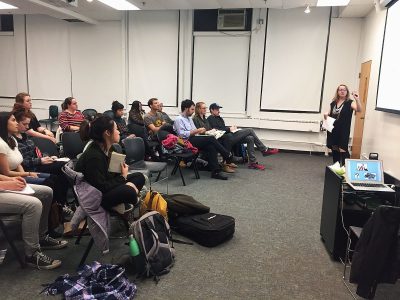
When BU arts professor Lucy Kim graduated from college and sought a career in her field, she balanced three-to-four service industry jobs at once in order to make ends meet.
“The first year after undergrad, I had a little space in an extra bedroom that my roommate and I used as a studio, but I didn’t make any work because I was so busy figuring out the logistics of being a grown up,” Kim wrote in an email.
College of Fine Arts professor Emily Worden hosted the Financial Literacy for Artists workshop Thursday at the CFA to teach students how they can support a career in the arts — one often associated with stories such as Kim’s — with methodical planning.
At the talk, Worden discussed how artists can effectively manage their budgets and potential debt to support their careers Worden is a Boston-based speaker and business coach who founded the online custom handbag company “eThreads,” and authored the book “Make. Sell. Repeat.: The Ultimate Business Guide for Artists, Crafters, and Makers.”
She teaches a Career Development for Artists course, which is part of CFA’s Arts Leadership minor.
Worden said her mission is to bring business tools to the arts. However, she said that wasn’t always the case. As an artist, she used to be very critical of business, calling it “evil” and “awful.”
“I used to protest business,” she said of her college years. “I hate[d] business.”
Today, Worden said she has a more positive outlook and believes there are well-intentioned people in business.
“You can do good things in business,” Worden said. “[You] could be in arts but study the business side of things. Learn how to do art better, how to operate in a smarter way.”
Worden talked about business-arts partnerships and how they can help artists who need to know how to make a living, yet may receive very little training on the subject during school, she said.
Worden said embracing business philosophies in arts can help artists propel their careers.
“We have this theory of taking entrepreneurship and applying it to your personal career,” Worden says. “I take the business terminology and the way of thinking of businesses and applying it to a person.”
Jeannette Guillemin, director of Arts Leadership and Innovation at BU, said she organized the talk on financial literacy and believes wholeheartedly in helping art students gain the technical knowledge they need to be successful in their careers.
“We are professionals who are really invested in this intersection between arts and business,” she said. “Everybody needs to have financial literacy. Everybody needs to understand how to do their taxes.”
Worden said Guillemin founded the Arts Leadership minor and that the classes within the minor address this issue directly. For example, Worden said one of the assignments in her course requires students to give a 30-second pitch about themselves and the purpose of their work and art.
She said they must be able to touch on three things: what they are bringing to the table, why they are different and why it matters.
The Arts Leadership minor is open to all BU students. It requires a minimum of five courses, all aimed at helping students of any arts discipline gain a leg up on managing their futures.
“Let’s equip students with these entrepreneurship skills so when they graduate, they’re graduating with more than just the technical skills,” Worden said. “They also have these career skills — this outlook on how to succeed in the world.”

















































































































